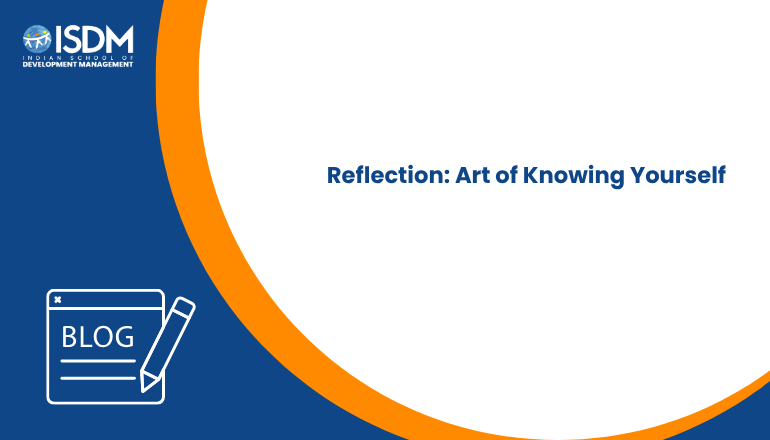When I first heard of the word reflection, I believed that it was all about observing my thought patterns—I think all the time, how is reflection any different? However, when I started reflecting regularly, I hit a gold mine. I realised that reflection is the art of engaging in a dialogue with yourself. The simple yet effective practice shifts the onus, or the burden, from others to yourself, to get answers/clarity.
As someone who worked almost independently since the beginning of her professional career in consulting, I have been conditioned to take decisions by myself and work on my own. However, during my journey at ISDM, I realised that group work is an integral part of the curriculum and takes a considerable amount of time. Therefore, collaboration becomes the guiding principle to work- collaboration with people from extremely diverse backgrounds.
The diversity comes not only in the form of professional background or academic background, but also in terms of life experiences, which leads to extremely different opinions, ideas, thought processes, and belief systems. While on one hand, the diversity added to my learning, on the other hand, it put me in situations where more often than not,
I faced challenges with regards to how I approached work, or how I collaborated with people.
In such situations, it became natural for me to react with anger, avoidance, or frustration, whereas others around me remained calm, or dealt with the situation with more ease. With time, I began to ask why I was the only one feeling that way. And that’s when reflection became my best friend. As a start, I began to identify the ‘what’. Instead of saying I felt low, I began to identify the feelings—anger, anxiety, frustration. As I reflected more, I began to see a pattern of common feelings, which led to a recurring behavioural pattern.
Over time, I became curious to ask ‘why’—why do I have a recurring pattern of anger or confusion? As I probed deeper, I understood that a lot of these reactions formed as a result of my conditioning, which shaped my belief system. Once I understood that my current belief system is hindering my growth, it helped me to make an effort to change the very belief system, thereby making a shift in my behaviour organically, and helping me become a more authentic version of myself.
The next time I faced a similar situation, it became relatively easier for me to respond to the situation with a sense of calm, helping me have more meaningful conversations; conversations without blame, anger or any negative emotion. Therefore, instead of changing my behaviour at a peripheral level, I have begun to ask myself what causes that behaviour, helping me to address the root cause that leads to the behaviour than to change the behaviour itself.
The thinking has reinforced the way I look at problems in the society—the challenges we see in the development sector today are a consequence of fundamental belief systems which govern the way we treat our planet, environment, society, animals, etc. For example, what value/belief system we attach to the environment decides how we treat it—individuals who attach spiritual value to environment preserve it, while those who attach economic value use environment as a resource. Therefore, changing consumer behaviour towards the environment may require us to first understand the belief systems that govern the behaviour before we work on changing only the behaviour.
The solution, therefore, lies in addressing the root cause, and not what is seen at the peripheral level.
The writer is a student of the 2nd batch of PGP in Development Leadership at ISDM
Source:https://www.youthkiawaaz.com/2019/03/reflection-and-the-art-of-knowing-y…




